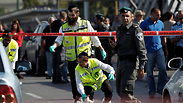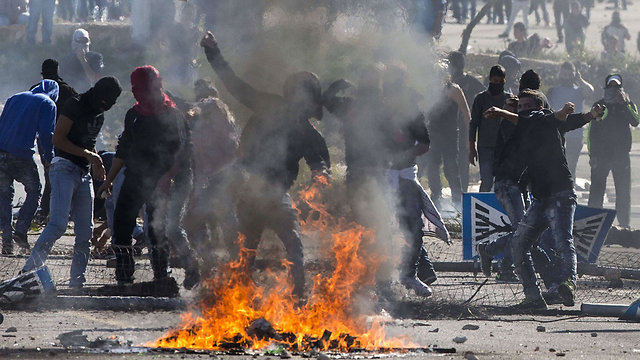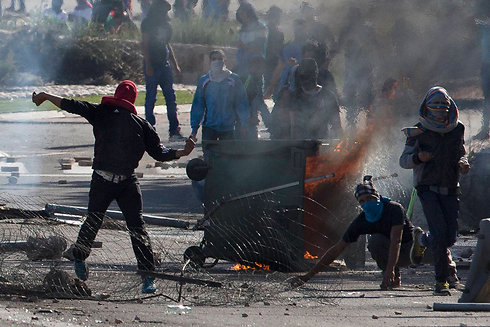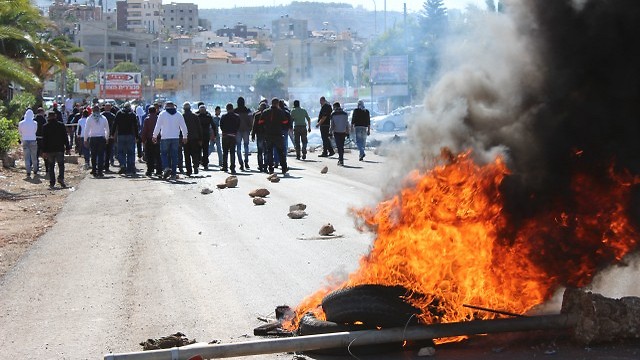
An intifada with an Islamic State influence
Analysis: The entire Muslim world is currently in violent religious frenzy, and even more so in our neighborhood; and while Israeli security forces have learned hard lessons from the previous intifadas, will it be enough?
The third intifada is gaining momentum, and is also following an all-too-familiar path: Jerusalem, Israel's Arab sector, Judea and Samaria and now Tel Aviv. The inferno leaps from place to place, and each new spot feeds and fuels the ones that came before. This is how it was during the first intifada, the intifada of stones, and this is how it was during second intifada, the intifada of suicide bombers.
But nonetheless, there are differences. The first and second intifadas each broke out almost solely due to one isolated incident. The third intifada erupted in March this year and has in fact escalated until it reached the current situation; it is actually underway in earnest in Jerusalem, the Arab sector and to a lesser extent the West Bank.
In Judea and Samaria, Mahmoud Abbas is working hard to ensure that his security forces prevent any large flare-ups. These would harm the image the Palestinian Authority is presenting to the world, and could undermine the political achievements it aspires to, such as a Security Council resolution that would recognize the state of Palestine within the 1967 borders.
Therefore, the Palestinian security forces operate in quite a determined fashion to prevent mass disturbances and the use of firearms in Judea and Samaria, but throwing stones, petrol bombs and Molotov cocktails does happen and becoming more common. The question now is how long Abbas can "occupy" the third intifada in the West Bank, unlike the permission and inspiration he gives to the riots in Jerusalem.
Events in Judea and Samaria are not yet out of control for another reason: Hamas and other Palestinian organizations cannot act in Jerusalem and the West Bank. This is simply because the Islamist groups have been crushed, following the kidnapping and murder of the three boys from Gush Etzion. Hamas can incite, but cannot produce explosive belts or recruit suicide bombers. This is true for the meantime, but it might well be that we will sooner or later see an organized armed struggle against us within the framework of the third intifada.
The knife attack Monday in Tel Aviv is a natural continuation of the ongoing escalation of the third intifada. This escalation is mainly due to inflamed religious sensibilities, the deaths of Jews and Arabs, the intolerable ease with which illegal aliens enter Israel, and the inflammatory provocations on the part of Jewish, Palestinian and Israeli Arab politicians. One should especially pay attention to the religious background of the riots in Jerusalem, the Palestinian territories and among Israeli Arabs.
Violent religious frenzy
The reason is the Islamic State – which has driven not only the Middle East but the entire Muslim world into a violent religious frenzy, disorganized but deadly, which was reflected not only on the Temple Mount, but also in Canada, Brussels and Germany. There is no place on the globe where there are Muslims that right now is not in religious turmoil, although it is all the greater here. There is a direct connection between the stabbing at the train station in Tel Aviv and the footage of Islamic State beheadings.
But in our case, political and nationalistic reasons unite with the worldwide combination of Islam and violent escalation.
One can take comfort in one fact: Unlike nationalist and religious politicians on both sides, who inflame the passions and make a considerable contribution to the violence, Israeli security forces have actually learned the lessons of the First Intifada. Police reinforcements are visible both in Jerusalem and population centers in the Arab sector, and the army is doing what it takes in Judea and Samaria. But the security blanket is small, the police cannot be everywhere, and if they go in too hard they will only feed the flames - as happened during the first and second intifadas - instead of smothering them.
Every Palestinian death will further inflame passions, especially if the circumstances of any death are not completely clear, or the Arab population believes that person to have been a victim of abuse by the Israeli security forces. Unfortunately, only if a terrorist is killed after he has murdered some Jews, is the death accepted on the Arab street. In this case, he is immediately branded a martyr and made into a symbol and servers to pour more fuel on the fire. In this way, the Third Intifada of the Palestinians in Jerusalem and on both sides of the Green Line escalates and grows.
In order to halt this intifada, public awareness is key, as this has proven itself to be effective during the previous intifadas. Beyond that, one must recognize that this is a pan-Palestinian phenomenon that draws inspiration from the Islamic religious flare-up unfolding in the Middle East and indeed in many other parts of the globe.
Another way of coping with this phenomenon is to flood the streets of Israel, including Jerusalem and the West Bank, with security forces. If necessary, one could introduce IDF patrols in Israeli territory, should the situation justify it as it did in the days of the other intifadas. The police alone cannot do the job, and we need to recognize that. After things calm down a little, it might be possible to remove the army.
Furthermore, there should also be strict rules for IDF soldiers and police on opening fire, restricting the use of firearms only to when there is an obvious and tangible threat to life. Care must also be taken that security forces are rotated and work in teams of at least five or six, in order to prevent a situation in which they are exposed to real life-threatening violence or trouble, such as in the West Bank or the Arab sector.
Elsewhere, measures from the second intifada should be taken to block the entry of illegal aliens into Israel, including tightening inspections at the crossings between Israel and the West Bank.
One more method is to tell the politicians to stop the incitement, and then take all necessary measures against them to make sure that they show restraint. All of these steps, if taken concurrently, can lead to quiet, and even if total calm is not restored, they would deter those attacks that are fueled by the hot air of incitement and religious motivation.













